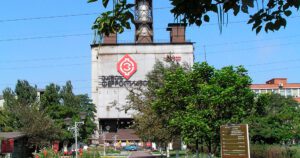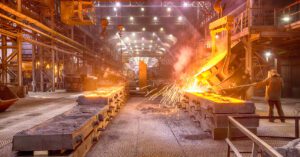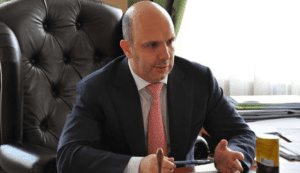
Siemens in Ukraine in the 2021 fiscal year (October 2020 – September 2021) has doubled the volume of orders and turnover in comparison with FY2020, CEO of Siemens Ukraine Maciej Tomasz Zielinski has said.
“Despite the COVID-19 pandemic, supply chain difficulties associated with supply disruptions, rising prices for materials 2021 turned out to be excellent from a financial point of view and the implementation of the set goals,” he said at a press conference in Kyiv in Tuesday.
Zielinski said that growth was recorded in all businesses of the company in Ukraine, including taking into account the growing demand of companies for digitalization solutions. At the same time, he did not specify the size of the company’s turnover in 2021.
As reported, the company’s initial plans for FY2021 envisaged at least maintaining turnover at the FY2020 level.
Referring to the issue of the company’s work in FY2022, Zielinski expressed his hope for the further development of all sectors.
“I hope that all sectors will develop in Ukraine. The sector where the lack of chips is most affected is the automotive industry, which is practically absent in Ukraine, and for example, the agricultural sector will develop rapidly, since it is a necessary resource for humanity, and Ukraine has a chance here [to increase supplies], including taking into account the disruption of supplies from the same Far East. And here we will continue to work, for example, with Kernel,” the CEO of the company said.
He also said that the pharmaceutical industry of Ukraine now using digital technologies can produce products at the level of European and American standards.
“I think that mechanical engineering will also develop, again due to the disruption of supplies from the Far East,” the CEO of Siemens Ukraine said.
Zielinski said that Siemens Ukraine itself continues to transform, and this year it has introduced a regime for its employees when an employee can work remotely for two or three days. According to him, today 85% of employees are vaccinated and provided with insurance in case of COVID-19 disease.
At the same time, according to him, only vaccinated or tested employees, or those with a doctor’s certificate, can work in the office.
Founded in 1997, Siemens Ukraine is a supplier of products, services and integrated solutions for energy, industry, transport, building automation and urban infrastructure. The central office is located in Kyiv, regional branches in Lviv, Dnipro, Kryvy Rih, Odesa and Kharkiv.

International arbitration proved to be thorough, efficient, trustworthy, and, thus, attractive mechanism of dispute resolution. The story, however, rarely happy-ends with obtaining an arbitral award in favour of either party. Quite often the succeeded party needs to go through recognition and enforcement proceedings in the national courts to restitute its violated rights. Such recognition and enforcement proceedings frequently become even more interesting battle terrain and create preclusive case-law in this sphere.
State’s Immunity
The decision of the Ukrainian Supreme Court issued on 25 January 2019 in case Everest Estate LLC and others v Russian Federation[1] was widely covered and discussed both in Ukrainian and foreign arbitration communities. And it is no surprise since in the said decision the Supreme Court for the first time dealt with the issue of the state immunity and enforcement of investment arbitral awards against foreign state’s assets located in Ukraine.
As a general rule a state has an immunity from a) a lawsuit against it, b) interim relief, c) enforcement of a court decision against it. This “absolute” state immunity, however, was shattered by the Supreme Court in its decision in Everest Estate LLC case.
Everest Estate LLC and others applied for recognition and enforcement of the UNCITRAL arbitral award rendered with respect to the expropriation of their property and real estate in the Crimea by the Russian Federation. The recognition and enforcement of the award was sought in Ukraine where the assets of the Russian Federation were allocated against which the enforcement could be levied. The court of the first instance granted the enforcement of the arbitral award but left out the issue of state immunity of the Russian Federation.
Having reconsidered the case the Supreme Court dealt with the state immunity of the Russian Federation and found that consenting for the arbitration under Ukraine-Russia bilateral investment treaty (BIT) which provides for contracting states’ obligations to recognize the finality and binding effect of an arbitral award rendered in any dispute arising from the BIT, the Russian Federation ipso facto waived all its jurisdictional immunities.
The case became notable since the Ukrainian court nearly stripped off the absolute immunity of the state and allowed recognition and enforcement of the arbitral award against Russia’s assets located in Ukraine.
Recognition and Enforcement of Emergency Arbitral Awards
Another investment arbitration case JKX Oil & Gas PLC & Others v Ukraine made quite a stir in arbitration community in Ukraine and abroad but not just because of the final award rendered in favour of the investors but in relation to the emergency arbitrator interim award. In fact, this was the first case where the Ukrainian Supreme Court considered the issue of enforceability of the emergency arbitral award in Ukraine.
In January 2015 the appointed emergency arbitrator rendered an interim award by which ordered Ukraine to refrain from collecting gas production royalties from the investors at the rate exceeding the previously applicable fee. JKX Oil & Gas PLC & others applied to the Ukrainian court for the enforcement of emergency arbitral award in Ukraine.
Despite the fact that the Ukrainian courts of first and appeal instances granted the recognition and enforcement of the emergency award, the Supreme Court’s position was the opposite. In particular, the Supreme Court found that enforcement of such interim award would have been contrary to the public policy of Ukraine and be considered as interference in the Ukrainian tax legislation and legislative activity.
Remarkable, that the issue of the finality of the emergency arbitral award was not considered by the Supreme Court at all. Under the United Nations Convention on the Recognition and Enforcement of Foreign Arbitral Awards 1958 (the “New York Convention”) the recognition and enforcement of the award may be refused inter alia if the award has not yet become binding on the parties. Thus, by not inferring to the issue of the finality of the emergency arbitral award the Supreme Court indirectly construed that arbitral interim measures are enforceable in principle under the New York Convention.
Sanctions as Public Order
In 2014 the legal environment in Ukraine was highly affected by the illegal annexation of the Crimea and Russian hostilities in the East of Ukraine. A vast range of economic sanctions were introduced by Ukraine in response to the Russian aggression and, thus, lots of overseas contracts concluded by the Ukrainian companies with Russian sanctioned counterparties defaulted. This gave a rise to multiple arbitration claims brought by Russian companies against Ukrainian entities. As a result, Ukrainian courts faced the problematics of recognition and enforcement of arbitral awards amidst special economic sanctions. економічних санкцій
In cases PJSC “Avia-FED-Service” v State Joint-Stock Holding Company “Artem” two different approaches were taken by the Ukrainian court with respect to granting recognition and enforcement of the arbitral awards rendered in favour of sanctioned Russian companies.
In first case[2] the Ukrainian Supreme Court considered the issue of sanctions and public policy of Ukraine and granted recognition and enforcement of the Russian ICAC award in Ukraine. In particular, the Supreme Court found that sanctions are not part of public policy and thus did not preclude recognition and enforcement of the arbitral awards issued in favour of the sanctioned companies in Ukraine.
In the second case[3] the position of the Supreme Court was quite the opposite. During the cassation review of the case the Supreme Court overruled the decisions of the courts of lower instances and refused recognition and enforcement of the Russian ICAC arbitral award in Ukraine. In its considerations the Supreme Court took into account the legal nature of PJSC “Avia-FED-Service” (the claimant) being the entity directly related to the Russian military enterprises and the fact that further enforcement of the Russian ICAC award would be for the benefit of the aggressor-state enterprises.
In its deliberations the Supreme Court assessed also the issue of further enforcement of the arbitral award in Ukraine which in fact would have been impossible in the circumstances of the imposed sanctions. The Supreme Court inter alia found that “sanctions represent one of the new aspects of the public policy in Ukraine” and, that the recognition and enforcement of the arbitral awards is within the competence of the court, but not of the enforcement authority. The Supreme Court, however, noted that the restrictive measures (sanctions) taken by Ukraine against the Russian PJSC “Avia-FED-Service” do not terminate the debtor’s obligations, nor do they make it impossible for it to comply with the Russian ICAC arbitral award after the termination of the sanctions against PJSC “Avia-FED-Service”.
The further court practice proved that the Ukrainian courts tend to follow the second approach while considering applications for recognition and enforcement of the arbitral awards issued in favour of sanctioned companies. Hence, even if such company has a favourable arbitral award it has to wait until the sanctions are lifted (if lifted at all).
The Limits of the Enforcement
Case Ostchem Holding Limited v Odesa Portside Plant (OPP) became another notable case related to granting enforcement of foreign arbitral awards in Ukraine. Ostchem Holding Limited applied to the Ukrainian court for recognition and enforcement of arbitral award against the state-owned Odesa Portside Plant (OPP). OPP was ordered to pay to Ostchem Holding Limited approximately USD 251 million under a gas supply contract.
Following success in arbitration proceedings Ostchem Holding Limited filed its application for recognition and enforcement of the arbitral award in Ukraine. While Ostchem Holding Limited succeeded in the first instance court, the appeal proceedings in the Supreme Court, however, turned to be a backblow.
In its decision issued on 8 June 2021[4] the Supreme Court refused recognition and enforcement of the arbitral award on public policy grounds. In particular, in its decision the Supreme Court found that the enforcement of the recovery of the debt and the accrued penalty under the arbitral award would make it impossible to keep OPP in a condition safe for its proper operation and, as a consequence, may threaten man-made and environmental disasters in the Odessa region (Ukraine).
The decision of the Supreme Court, though doubtful on the legal grounds, evoke though the issue of reasonable limits of enforcement of the arbitral awards against strategic enterprises and the impact of such enforcement to public interests.
The above cases became remarkable and wildly discussed in arbitration community as they set the further trends to be followed by the Ukrainian courts while considering arbitration related matters.
[1] Case No. 796/165/2018 (https://reyestr.court.gov.ua/Review/79573187)
[2] Case No. 761/46285/16-ц (https://reyestr.court.gov.ua/Review/86903591)
[3] Case No. 824/100/19 (https://reyestr.court.gov.ua/Review/87760125)
[4] Case No. 824/241/2018 (https://reyestr.court.gov.ua/Review/97736188)

Zaporizhia Ferroalloy Plant (ZFP) in January-August this year increased its output by 0.7% compared to the same period last year, to 139,810 tonnes.
As the Ukrainian Association of Producers of Ferroalloys and Other Electrometallurgical Products told Interfax-Ukraine, over eight months of the year, the plant reduced production of silicon manganese by 29.4%, to 46,310 tonnes, but increased output of ferrosilicon – by 34.4%, to 53,840 tonnes, and ferromanganese – by 11%, to 34,840 tonnes.
The enterprise also increased production of metallic manganese by 2.7 times, to 4,820 tonnes.
In August, 21,000 tonnes of ferroalloys were produced.
Zaporizhia Ferroalloy Plant is one of three Ukrainian manufacturers of these products. The share of the domestic market of its supplies is 30-35%. Products are exported to the CIS countries, the European Union, Asia and Africa.

Ferroalloy enterprises of Ukraine in January-August of this year increased their production by 8% in total compared to the same period last year, to 587,620 tonnes, including 88,930 tonnes produced in August.
As the Ukrainian Association of Producers of Ferroalloys and Other Electrometallurgical Products told Interfax-Ukraine, in January-August 2021 production of silicon manganese at Zaporizhia and Nikopol Ferroalloy Plants increased by 11.3%, to 458,360 tonnes. At the same time, the total production of ferromanganese at three plants decreased by 22.1%, to 70,600 tonnes: Zaporizhia, Nikopol and Kramatorsk Ferroalloy Plants (Kramatorsk plant was idle in January-August 2021, while in the same period of 2020 it produced 34,090 tonnes).
In addition, in Ukraine, production of ferrosilicon (equivalent to 45% ferrosilicon) increased by 34.4%, to 53,840 tonnes, and metallic manganese – by 2.7 times, to 4,820 tonnes.
Pokrov (previously Ordzhonikidze) and Marhanets Mining and Processing Plants (both located in Dnipropetrovsk region) which extract and concentrate manganese ore, in January-August 2021 produced a total of 1.122 million tonnes of manganese concentrate, which is 3.8% lower compared to January-August 2020. At the same time, Marhanets plant produced 364,100 tonnes of concentrate (a decrease of 1.06% compared to the same period in 2020), and Pokrov plant produced 757,940 tonnes (a decrease of 5.1%).
In January-August 2021, Pokrov Mining and Processing Plant also produced 195,040 tonnes of iron ore sinter (93% more compared to the same period in 2020), supplying it to Dniprovsky Metallurgical Plant (DMZ), part of DCH Steel from DCH Group of businessman Oleksandr Yaroslavsky.

Accrued insurance premiums under Green Card international insurance agreements concluded by the member companies of the Motor (Transport) Insurance Bureau of Ukraine (MTIBU) in January-August 2021 increased by 37.52% compared to the same period in 2020, to UAH 1.075 billion.
According to the MTIBU website, the number of Green Card agreements concluded during this period increased by 22.04%, to 496,200.
At the same time, the amount of compensations paid on claims decreased by 35.54%, to EUR 7.865 million, the number of claims paid – by 20.26%, to 3,302.
The MTIBU is the only association of insurers that provide compulsory insurance of civil liability of land vehicle owners for damage caused to third parties.
Green Card is a system of insurance coverage for victims of road traffic accidents, regardless of their country of residence and the country of registration of the vehicle. The Green Card program covers the territory of 47 countries in Europe, Asia and Africa.
According to the decision adopted by the General Assembly of the Council of the Bureaux of the Green Card international auto insurance system in Luxembourg in May 2004, Ukraine since January 1, 2005 has been a full member of this system.

Similar to other European countries, Ukraine has declared its strive to complete shift to clean energy use. But on the way of the so-called “energy transition” natural gas will continue playing an important role for more than one decade – as a “transitional fuel”. In order not to be dependent on gas supplies, Ukraine has to increase its production, especially considering that the country has one of the largest gas reserves in Europe.
This and other important topics will be discussed at the Ukraine Gas Investment Congress, which starts on October, 20 in Kiev, involving business leaders from all around the world. On the eve of the Congress, Roman Abramovsky, Minister of Environmental Protection and Natural Resources of Ukraine, is telling about the situation in the industry and prospects in a blitz interview.
“The State is ready not only to support, but also to act as a guarantor of complex risky projects. And I would like our international partners and investors to hear this message,” emphasizes Mr.Abramovsky.
Roman Abramovsky, the Minister of Environmental Protection and Natural Resources of Ukraine
Our intention to reduce the environmental impact is in line with the European Green Deal. We consider Ukraine as a member of the European community. Therefore, we share its aspirations, values and standards.
Our ministry acts as an engine and mouthpiece of changes in the ecosystem. This year, we have prepared proposals to reduce national greenhouse gas emissions by 65% compared with 1990 by 2030. The green course will have an impact on all economy sectors, including energy, manufacturing, transport, utilities, agriculture, forestry and waste management.
In particular, for the energy sector, there is a goal to increase power generation from renewable sources (solar and wind). Their share in power generation should grow to 17% in 2030 and up to 25% in 2035, which is provided for in the energy strategy of Ukraine. Ukraine is already one of the European leaders in the development of green energy generation and potential for further growth is far from exhausted.
Now we are also actively discussing the huge prospects of Ukraine in the area of hydrogen production and transmission. Namely, Naftogaz of Ukraine is already planning the first pilot projects in cooperation with Germany’s RWE.
Along with the development of green capabilities, we will decommission heat generating units with expired service life and provide for the gradual abandonment of coal mines. Of course, this will be accompanied by coal regions transformation programmes.
The energy transition cannot take place in an instant, especially in such a large, industrialised country with a high level of energy consumption. We will not be able to stop using fossil fuel completely, so like the rest of the world, we consider gas as a transitional energy carrier. In the next 10-15 years, its role will remain essential. First, as a replacement for coal that is significantly more harmful to the environment, and secondly, to provide room for manoeuvre.
Ukraine is lucky to have some of the largest gas fields in Europe, however at the same time, their potential was not fully utilised, and the country was losing both hydrocarbons and money. Since my appointment in 2020, I have initiated the development of large oil and gas bearing areas, where no exploration was previously carried out. In particular, I managed to restart the large Black Sea exploration project. At the end of 2020, Naftogaz of Ukraine obtained licenses for exploration of several dozen blocks. They have great potential and can open a new chapter for Ukraine’s oil and gas industry. This is evidenced by the success of our neighbours – Romania and Turkey, which have explored significant reserves in the Black Sea.
We have also started developing large onshore oil and gas fields that were previously inaccessible to investors, including the Yuzivske field, which is unique in size and potential.
The climate goals that we set for ourselves are ambitious and require huge resources. Therefore, over the next 10 years, Ukraine will need Euro102 billion of capital investment to finance decarbonisation projects.
Some of them will be provided by businesses. Companies should adjust their development plans to adapt to the Green Deal and decarbonisation. They need to understand that this is no longer a nice to have, but a mandatory requirement for their further sustainable development.
Part of the costs will be covered by the State. For example, by direct loans to businesses at acceptable interest rates so that businesses can introduce decarbonisation measures.
At the same time, we are very limited with our in-house resources, and I constantly emphasise this during meetings with foreign stakeholders, in particular, with the ambassadors of the G7 countries. Therefore, we count on external investment and are actively working to inform investors about the opportunities that await them in Ukraine. Compared to other European countries, the Ukrainian economy requires almost the largest investment. To attract attention of investors, we must offer almost turnkey projects with a guarantee of mutual benefit.
Today, Ukraine is improving the investment climate not with words, but with concrete actions. The State is ready not only to support, but also to act as a guarantor of complex risky projects. And I would like our international partners and investors to hear this message.
Without a doubt, it will be an outstanding event. Perhaps for the first time in many years, important issues of the energy industry and the energy transition will be considered with the involvement of the country’s leaders, international stakeholders and business representatives from more than 15 countries. This will be an opportunity to look at and assess risks and opportunities from different angles and from different perspectives.
I hope that that Ukraine Gas Investment Congress will become a platform for making important decisions, launching new projects and areas of cooperation.
Moreover, I hope that the Congress will help numerous investors and partners learn about the business opportunities that exist today in Ukraine, as well as what is being done to implement these opportunities as easily and quickly as possible.
Ukraine Gas Investment Congress received support from our Ministry and other government representatives. We will be happy to meet with all interested parties and will be open to discussions on topical issues.